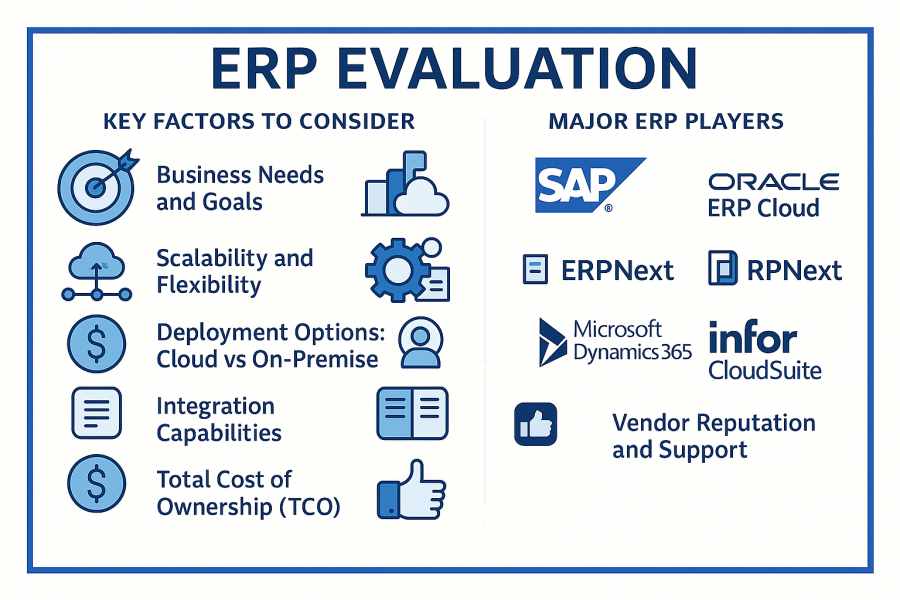- inquiry@v10x.com
- DSK Rohit, office No-13, 3rd Floor, 1264/2 Apte Road, Deccan Gymkhana, Shivajinagar, Pune - 411 004. Maharashtra, INDIA
ERP Evaluation: Choosing the Right System for Your Business
- Home
- Blog Details
Selecting an ERP system is one of the most critical decisions for any growing business. The right ERP can streamline operations, boost efficiency, and provide real-time insights, while the wrong choice can lead to wasted resources and implementation headaches. That’s why conducting a proper ERP evaluation is essential before making the investment.
Why ERP Evaluation Matters
ERP systems are not one-size-fits-all. Every business has its own processes, challenges, and goals. Evaluating ERP solutions helps ensure that the system you choose aligns with your company’s unique needs. A thorough evaluation prevents costly mistakes, reduces the risk of failure, and maximizes the return on investment.
Key Factors to Consider During ERP Evaluation
1. Business Needs and Goals
Start by identifying what you want the ERP to achieve. Are you looking to reduce manual work, gain better visibility, or improve customer service? Mapping ERP features to your business goals ensures you don’t get distracted by “nice-to-have” features that add cost but little value.
2. Scalability and Flexibility
Your ERP should grow with your business. Choose a solution that can adapt to changes in team size, new product lines, additional markets, or evolving industry regulations.
3. Deployment Options: Cloud vs On-Premise
Evaluate whether a cloud ERP or on-premise ERP suits you better. Cloud offers lower upfront costs, remote access, and automatic updates, while on-premise provides more control but requires significant infrastructure and IT support.
4. Integration Capabilities
An ERP system should not exist in isolation. Check how easily it integrates with your existing tools like CRM, HR software, or e-commerce platforms. Smooth integration ensures centralized data and avoids silos.
5. User Experience and Training
Even the best ERP system fails if your team can’t use it effectively. Look for a user-friendly interface and assess the vendor’s training and support options. Employee adoption is key to success.
6. Total Cost of Ownership (TCO)
The cost of an ERP system is more than just the license or subscription fee. Factor in implementation, customization, training, maintenance, and potential upgrade costs when evaluating your budget.
7. Vendor Reputation and Support
Choose a trusted ERP provider with a proven track record. Check customer reviews, industry experience, and post-implementation support. A reliable vendor can make the difference between a smooth rollout and a failed project.
Major ERP Players
- SAP S/4HANA-Cloud, on-premise, hybrid. Real-time analytics (in-memory database)
- Oracle ERP Cloud-Cloud-based, modular, regular updates. Strong financials, procurement, project & supply chain features.
- ERPNext-Open-source, good range of standard modules (accounting, inventory, HR, sales etc.), cloud and self-hosted options.
- Microsoft Dynamics 365-Cloud or hybrid. Strong integration with Microsoft products (Office, Power BI, Azure). Modularity so you pay for what you need.
- Infor CloudSuite-Cloud-based, often industry-tailored suites (manufacturing, retail, healthcare etc.). Good supply chain & operations focus
What to Compare Among These Options
When you’re reviewing these ERP systems, use a comparison checklist covering:
Functionality vs Your Needs: Does the ERP provide modules that match your critical processes (sales, inventory, HR, manufacturing, etc.)?
Cost Structure: License / subscription cost, cost of customizations, training, maintenance, upgrades.
Support & Localisation: Local support, local compliance (tax, language, reporting norms).
Ease of Customization & Integrations: How easy it is to integrate with your existing tools (CRM, e-Commerce, third-party), API availability.
Scalability: Can it grow with you? Handles addition of users, expansion of operations (multi-branch, multi-language, multi-currency).
Vendor Stability & Upgrades: Reliability, frequency of updates, vendor ecosystem and partner network.
User Adoption & UX: How easy it is for your teams to use. Good interface, training resources, documentation.
Security & Data Management: How the ERP handles data protection, backups, permissions, access control.
Common Mistakes to Avoid
Choosing an ERP based only on price.
Ignoring future scalability needs.
Not involving end-users in the evaluation process.
Overlooking the importance of training and change management.
The Bigger Picture
Evaluating ERP systems is not just about picking software—it’s about choosing a long-term partner for your business operations. A well-evaluated ERP can centralize processes, enhance collaboration, and empower leaders with real-time insights to make better decisions.



Write A Comment